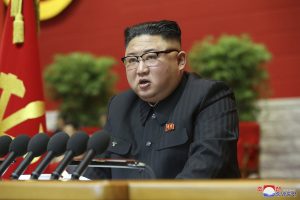North Korea’s Korean Central News Agency reported today that the ruling Workers’ Party’s Eighth Congress had convened in Pyongyang, the capital, on January 5.
“I am confident that the Congress will work as a stepping stone for our struggle to strengthen our national power and improve people’s lives,” said North Korean leader Kim Jong Un in his opening speech.
Kim commended his country’s quarantine measures, in place since January 2020, citing the country’s own statistics that there have been no COVID-19 cases confirmed in North Korea.
However, he admitted that “the five-year economic development plan has failed in almost all sectors.” China is the North’s biggest trading partner, and amid COVID-19 border closures trade between North Korea and China fell 76 percent year-on-year.
In North Korea, the direction and policies of the ruling Workers’ Party are determined during the Congress, last held in May 2016. Experts say Kim is likely to propose new foreign policies to deal with the United States and South Korea and is expected to propose a new five-year economic development plan to recover the failure of the last blueprint. And Kim Yo Jong, the younger sister of Kim Jong Un, might be tapped for a higher position, as a reshuffle of Kim’s cabinet could happen during the Congress.
“The party Congress is a tool for national unity and governing legitimacy. Kim will unveil a new economic plan and present a lineup of loyal cadres to implement it. The Congress will maintain North Korea’s ideology and cult of leadership,” said Leif-Eric Easley, a professor at Ewha University in Seoul. He added that Kim “might not comment specifically on the incoming Biden administration but instead pledge that North Korea won’t give in to international pressure.”
Regarding North Korea-U.S. relations, Kim might deliver new messages toward the incoming Biden administration before the inauguration on January 20. However, some experts say that Kim will not send a message directly to U.S. President-elect Joe Biden, but will wait for messages from new counterparts in the Biden administration to resume dialogue between the two countries.
The North’s principal position is that it will only continue negotiations with the U.S. on nuclear weapons after the withdrawal of economic sanctions. However, the Biden administration is unlikely to lift the sanctions first, and instead is expected to largely replicate the Obama administration’s “strategic patience” strategy to handle North Korea issues.
At the Workers’ Party’s Seventh Congress, which was held in 2016 as the first party congress in more than 30 years, Kim said that he will “improve and normalize relations” with hostile countries on the premise of “respect for self-reliance.” The word “nuclear” was not mentioned on the main agenda for the party convention on January 4, an interesting development considering that Kim used to call North Korea a “nuclear power” and expressed his willingness to continue nuclear development during the previous Congress.
However, after experiencing three failed U.S.-North Korea summits, experts say Kim will maintain his position that the United States should withdraw its hostile policies toward the North as a precondition to dialogue. Unlike U.S. President Donald Trump, Biden will not consider a top-down approach, which Trump preferred in his talks with Kim. Instead, the Biden administration will likely seek to have working-level negotiations on the North’s denuclearization.
Kim also needs to rebuild the relationship with South Korea in 2021. North Korea began to refuse dialogue and cooperation in 2019, holding South Korea responsible for the breakdown of the U.S.-North Korea Hanoi Summit in Vietnam in February of that year. In addition, in June 2020 North Korea blew up a joint inter-Korean liaison office in Kaesong, citing its dissatisfaction over the anti-North Korea leaflets that came from the South. South Korea’s National Assembly passed a bill last month to ban the launching of such leaflets.
Though the South Korean government has tried hard to bring North Korea back to the table, tensions heightened between the two countries last September when a South Korean official from the Ministry of Oceans and Fisheries was shot dead by North Korean troops in the West Sea (South Korea’s name for the Yellow Sea). However, some predict that talks between the two Koreas or the restoration of relations remains a possibility, given that Kim issued a rare apology after the incident.
North Korea has no choice but should utilize South Korea strategically to resume negotiations with the United States. However, it cannot ask for other countries’ support at this point as Pyongyang remains concerned about the spread of the coronavirus from outside. The North has adopted drastic, harsh, and aggressive COVID-19 containment measures ever since the pandemic began, despite facing huge economic damage.
The Congress is going to continue this week, and Kim will deliver more important messages in the upcoming days.

































